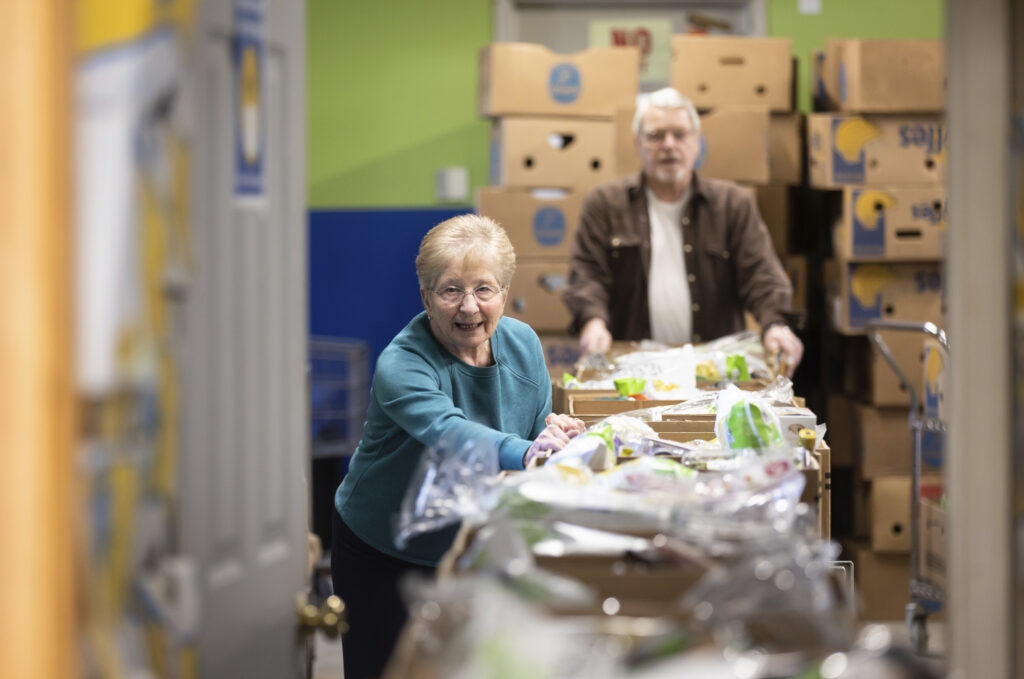Leaders look inward to build a better Maine for older residents

Rachel Paquet moves boxes of food along a conveyor belt while volunteering at the York County Shelter Program in Alfred. Rachel's husband, Carroll, waits to load another box. Older individuals comprise about 70 percent of the nonprofit organization's volunteers. Jill Brady photo
So, think you're an ageist?
Probably not. But odds are that you carry a lifetime of learnings about how we perceive older people. Who hasn't grumbled about a slow "old" driver or laughed off a comment that you don't "look your age"?
Ageism, however, isn't a laughing matter: It influences how we view ourselves and others, affects our health, and impacts our economy. Now leaders in Maine, the "oldest" state in the nation, are on a quest to end ageism here.
The Power in Aging project, supported by MaineCF and led by the Maine Council on Aging, focuses on building an age-positive culture by addressing ageism at systemic, internalized, interpersonal, and institutional levels.
The effort grew from MaineCF's strategic goal to help ensure all older people in Maine are valued and able to thrive. Vice President of Community Impact Laura Lee, who led the initiative, heard from leaders in the aging field that their work was underfunded because the older people they served were undervalued.
"They saw ageism as a root cause that was preventing older, often low-income, people from getting the services and help they needed," Lee said. "This fundamental issue of how we value older people in our society is something we decided to address first through a reframing aging initiative, aimed at changing how we think and talk about aging and older people."
MaineCF also awarded grants to Maine communities working on lifelong community initiatives and developed a fellows program for older adult volunteers to assist those communities.
Today that work has broadened from how we talk about aging to understanding how we feel about it.
The Maine Council on Aging, with MaineCF funding, has convened four cohorts of community leaders to examine how they - and society - view aging. To date, 84 Maine and New Hampshire leaders of all ages have participated in the Leadership Exchange on Ageism (LEA). The program is the first of its kind in the country and has received three more years of funding from another foundation to continue its work here and replicate the program in other states.
The 14 hours of sessions about ageism are personal and affirming and offer a new vision of what growing older could be, said Jess Maurer, director of the Maine Council on Aging. For some participants, it also means coming to terms with their own anxiety about aging. (Listen to our "Maine Ties" podcast with Jess Maurer)
Maurer suggested the program after she attended MaineCF's Leadership Learning Exchange for Equity. The cohorts brought Maine leaders together for several weekly sessions of peer-to-peer learning about racism. The program has continued in partnership with Thomas College.
"Ageism is against our own self-interest," Maurer said. "All the research says that if you live in an age-positive environment or with age-positive values or concepts, you're going to live your best life as you get older."
People who adopt a healthier view of aging live longer, are less likely to have cognitive problems, have less anxiety, and heal faster. "So why are we so afraid of it?" Maurer asked.
LEA also challenges participants to take action against ageism in systems and institutions that focus on the future - our children - but devote fewer resources to older adults.
The message, Maurer said, is "kids are vulnerable, and they are our future, and older adults - somebody else should take care of that. We need to shift that to say older people are our future and our present.
"We haven't invested in all kinds of ways to support people living in Maine into their 80s, 90s, and 100s, which is when things really start to get problematic," Maurer said. "LEA is really helping to open people's eyes to why we aren't and the kinds of solutions that we need."
Lee, of MaineCF, says LEA is making great headway by changing hearts and minds, one person or one cohort at a time.
"It's not quick or easy work," she said, "but once your eyes have been opened to the bias and discrimination against older people in our culture and society and even in ourselves, it's impossible to unsee it."





